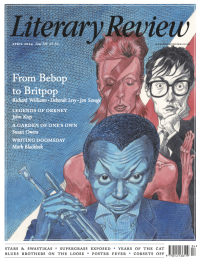Chris Power
Toccata & Fugue
The Children’s Bach
By Helen Garner
Weidenfeld & Nicolson 176pp £9.99
After the publication of her first novel, Monkey Grip, about the relationship between a single mother and a junky in bohemian 1970s Melbourne, Helen Garner tried to write the same book again. ‘My publishers said it was shit’, she told an interviewer a couple of years ago, ‘and they were absolutely right, so I threw away all the really crappy bits and broke it into two stories. But,’ she continued, ‘by the time I published The Children’s Bach, four years later, I had somehow learned to write.’
Not just write but create something that is now considered one of the most significant Australian novels of the last fifty years. The Children’s Bach, first published in 1984 and long out of print in the UK, describes the fracture and complicated restoration of a shabby-genteel family, the Foxes, in early 1980s Melbourne. It is a short book that feels as if it has been boiled down from a much larger one until only the most essential elements remain. It combines omniscience with dirty-realist minimalism – a unique tenor lying somewhere between the styles of George Eliot and Raymond Carver – darting from one short episode to the next without exposition or anything but the most efficient kind of scene-setting. Here, in one of the lengthier examples, Garner describes the kitchen belonging to the novel’s central family:
Because it had only one source of light, a yellow-shaded standard lamp at head-height against a wall, the Fox family’s kitchen was like a burrow, rounded rather than cubed, as if its corners had been stuffed with dry grass. The air shimmered with warmth. The table, large, wooden, scarred,

Sign Up to our newsletter
Receive free articles, highlights from the archive, news, details of prizes, and much more.@Lit_Review
Follow Literary Review on Twitter
Twitter Feed
The era of dollar dominance might be coming to an end. But if not the dollar, which currency will be the backbone of the global economic system?
@HowardJDavies weighs up the alternatives.
Howard Davies - Greenbacks Down, First Editions Up
Howard Davies: Greenbacks Down, First Editions Up - Our Dollar, Your Problem: An Insider’s View of Seven Turbulent...
literaryreview.co.uk
Johannes Gutenberg cut corners at every turn when putting together his bible. How, then, did his creation achieve such renown?
@JosephHone_ investigates.
Joseph Hone - Start the Presses!
Joseph Hone: Start the Presses! - Johannes Gutenberg: A Biography in Books by Eric Marshall White
literaryreview.co.uk
Convinced of her own brilliance, Gertrude Stein wished to be ‘as popular as Gilbert and Sullivan’ and laboured tirelessly to ensure that her celebrity would outlive her.
@sophieolive examines the real Stein.
Sophie Oliver - The Once & Future Genius
Sophie Oliver: The Once & Future Genius - Gertrude Stein: An Afterlife by Francesca Wade
literaryreview.co.uk